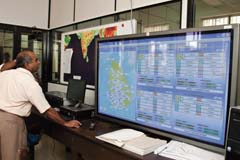Recognize that crisis management is not linear' 'Put "local" at the center' --The messages of JICA-RI's project were in line with the World Humanitarian Summit
2016.06.23
The World Humanitarian Summit was held in Istanbul, Turkey, May 23 and 24, 2016. From the JICA Research Institute, Research Fellow Oscar A. Gomez and former Senior Research Fellow Atsushi Hanatani (current Executive Advisor to the Director General of the JICA General Infrastructure and Peacebuilding Department) participated in the Summit. Two publications prepared for the event, "The Continuum of Humanitarian Crisis Management - Messages for the World Humanitarian Summit" and the research paper "The Continuum of Humanitarian Crisis Management: Multiple approaches and the challenge of convergence" were distributed at one of the side events.
The publications are the result of JICA-RI's research project "Comparative Study of Humanitarian Crisis Management from the Perspective of Bilateral Cooperation Agencies," which started in January 2015 covering selected case studies of "natural" disasters and violent conflicts. As a result of the project, JICA-RI suggested the following five messages: 1. Recognize that crisis management is not linear, 2. Transcend the divide of mandates and mindsets, 3. Putting ‘local' at the center, 4. Prevention starts from crisis day one, and 5. Consolidate a demand-driven rearrangement of crisis-related global cooperation.
"Putting ‘local' at the center" was a goal emphasized throughout the summit that received general support. Besides, JICA-RI's messages were instrumental in framing the joint declaration of the side event "Strengthening the Humanitarian-Development Nexus: Collaborative Approaches to Find Solutions for Forcibly Displaced Persons," organized by the Japanese government and the Solutions Alliance.

A project to enhance disaster management capacity adaptable to climate change in Sri Lanka(Photo: JICA/Shinichi Kuno)
Around 9,000 people - from 173 countries, international agencies, NGOs and academia - participated in the first World Humanitarian Summit. During the two days of the event, there were a plenary session, seven high-level leaders' round tables, 15 special sessions and 132 side events.
Gomez attended nine side events including "Linking Humanitarian, Disaster Risk Management and Peacebuilding Approaches," "Resilience: Translating Promise into Reality" and "The Migrants in Countries in Crisis Initiative: Leave No One Behind."
He said, "Crisis management and the future of humanitarian and development cooperation, the main focus of our research at JICA-RI, was a major theme discussed during the summit. Thus, Istanbul was a great opportunity to gather information, learn from the ways other stakeholders are approaching the theme and to directly exchange opinions with them about their experiences. Our interactions will be useful framing the conclusions of the present research and informing future projects."
JICA President Shinichi Kitaoka participated in the side event "Strengthening the Humanitarian-Development Nexus: Collaborative Approaches to Find Solutions for Forcibly Displaced Persons."

事業事前評価表(地球規模課題対応国際科学技術協力(SATREPS)).国際協力機構 地球環境部 . 防災第一チーム. 1.案件名.国 名: フィリピン共和国.

事業事前評価表(地球規模課題対応国際科学技術協力(SATREPS)).国際協力機構 地球環境部 . 防災第一チーム. 1.案件名.国 名: フィリピン共和国.

事業事前評価表(地球規模課題対応国際科学技術協力(SATREPS)).国際協力機構 地球環境部 . 防災第一チーム. 1.案件名.国 名: フィリピン共和国.

事業事前評価表(地球規模課題対応国際科学技術協力(SATREPS)).国際協力機構 地球環境部 . 防災第一チーム. 1.案件名.国 名: フィリピン共和国.

事業事前評価表(地球規模課題対応国際科学技術協力(SATREPS)).国際協力機構 地球環境部 . 防災第一チーム. 1.案件名.国 名: フィリピン共和国.
scroll